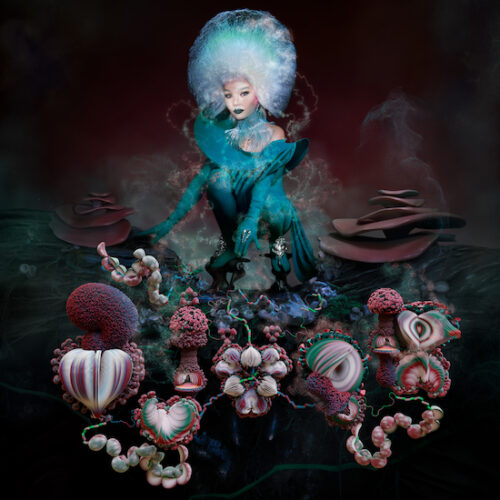Credit: Vidar Logi
“I am her hope-keeper,” Björk sings on ‘Ancestress’, “an epitaph,” one of a pair of songs (along with ‘Sorrowful Soil’) dedicated to her late mother Hildur Rúna Hauksdóttir. Hope is a major theme on this, Björk’s tenth record: hope as survival mechanism, holding hope for those that aren’t ready to receive it yet, and hope as a transformative force. And there is so much force in this record. This bass-heavy, shape-shifting, clarinet-driven, spiritually-refining record.
Björk has spoken of this as her fungus-themed album. The potency and symbolism of mushrooms, earthy and nourishing, mind-expanding and natural, all fold in to its sweeping soundscapes. The word ‘fossora’ roughly translates to a feminisation of the Latin term for ‘digger’ and Björk has always been a miner, from the introverted grandiosity of 1997’s Homogenic, to the delicate vulnerability of 2001’s Vespertine, searching the cosmos on 2011’s Biophilia, and the wrecking nature of heartbreak on 2015’s Vulnicura. In a way, Fossora is a response to 2017’s Utopia, which staked out a female-led paradise in the midst of patriarchal chaos, full of solution and resolution.
Fossora takes things further, deeper, and it partly (improbably) involves gabber. Perhaps this is because it is a record as much about the body as it is the soul. About a sense of movement amid restriction, about the complicated nature of women’s bodies, their specificity, and their incredible generosity, in spite of society’s thwarting nature.
Like so much of Björk’s work, sensuality is at its core. It is there in the Jungian shadow kingdom on album opener ‘Atopos’. “Are these not just excuses to not connect?” she asks, over frantic bass clarinets, seeking a kind of balance. It complements ‘Victimhood’, which takes the psychoanalytic exploration further. Ominous and profound, it is almost dub-like, with voices chanting and chasing each other into a meditative state. Again, the track features the bass clarinet sextet, consisting of three men and three women – seeking to strike that balance again, and perhaps a more achievable harmony.
Björk began writing this in 2019, in a cabin outside Reykjavík, initially conceiving it as a conceptual clarinet album. But Fossora eventually morphed into an Iceland album, taking the sense of an island nation, both elemental and yet cocooned – a feeling that was amplified by the arrival of the pandemic. She talks of that period as a comfort, feeling more rooted than ever, allowing further excavation of the choral and folk traditions she grew up with, as well as other pathways of disruption.
That disruption comes in many forms, from some of the beats provided by the Indonesian experimental duo Gabber Modus Operandi and their “biological techno”, to the matriarchal response to a traditionally patriarchal eulogy in ‘Sorrowful Soil’, where Björk and the choir Hamrahlíðarkórinn sing lovingly to her mother, “woven with a mother’s life force, this is emotional textile, self-sacrificial”. It is also there in the way she approaches the voice as instrument on the enlivening, celestial ‘Mycelia’.
‘Ovule’ is one of the album’s highlights, a trombone-driven treatise on three facets of our being: ideals, realities and darkness – all that must co-exist in life. It is also about how love can be found in less-obvious places, and how love is labour. That love is expressed so clearly in the musically voluptuous ‘Allow’, with its dancing flutes and loping beats that resemble a heartbeat finding its own unique rhythm.
‘Fagurt Er í Fjörðum’ (based around an eighteenth-century poem by Látra-Björg) with its delicate grace, refers us back to ‘Cocoon’ from Vespertine and its similarly immersive wash of beauty. ‘Fungal City’, with its strings-led vivacity and serpentwithfeet’s vocals, is lusciously light and dreamy. ‘Trölla-Gabba’ experiments with voices that trip into eerie, relentless beats, and ‘Freefall’ features elegant strings that seem to sigh and yearn. It is restless and illuminating. Title song ‘Fossora’ seamlessly marries the ancient and modern, addressing legacy and ancestry with plucky-sounding oboe resting its back on furious beats, as it bleeds and crashes, finding itself, ultimately, at a rave.
‘Ancestress’ is one of many pinnacles from Björk’s storied career. It is a reckoning with regret, possibility, and responsibility, with its bursts of voices and bells, emerging seemingly out of the earth, careening into the sky. It is pure poetry. Aided by her son Sindri, it mirrors album closer ‘Her Mother’s House’, which folds in her clear-voiced daughter Doa, and a reedy cor anglais. That song is a love-letter of sorts, about the dynamic between mothers and daughters. It is also a lament about a myriad of things – absences mainly – but it moves on many levels as Björk reaches to understand her daughter’s independence, as well as acknowledging her mother’s, and in turn, her own – creating a new kind of space.
Its clarity amid loving envelopment brings to mind Kate Bush’s ‘A Coral Room’ from 2005’s Aerial, where Bush meets grief for her mother in unexpected, flooring ways. “My mother and her little brown jug… it held her milk”. This too is the magic of Fossora, a gift of a record that simply devastates.
Björk has previously spoken of her love of The Diary of Anaïs Nin, because Nin was a female artist who fearlessly documented all stages of her life with equal, lyrical rigour. Mapping out her sensibility in Volume One: 1931–1934, she writes, “I disregard the proportions, the measures, the tempo of the ordinary world. I refuse to live in the ordinary world as ordinary women. To enter ordinary relationships. I want ecstasy. I am a neurotic – in the sense that I live in my world.”
Like Nin, Björk is perhaps an accidental teacher, but she is a natural one, part of a tradition of incredible artists that create an environment of their own in which to thrive and thrash. It is an environment that invites us in too, which itself is a kind of devotional act.



